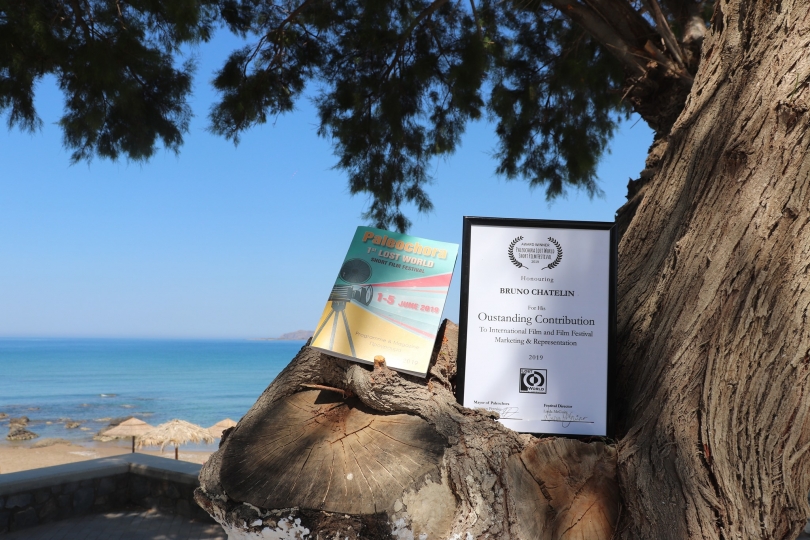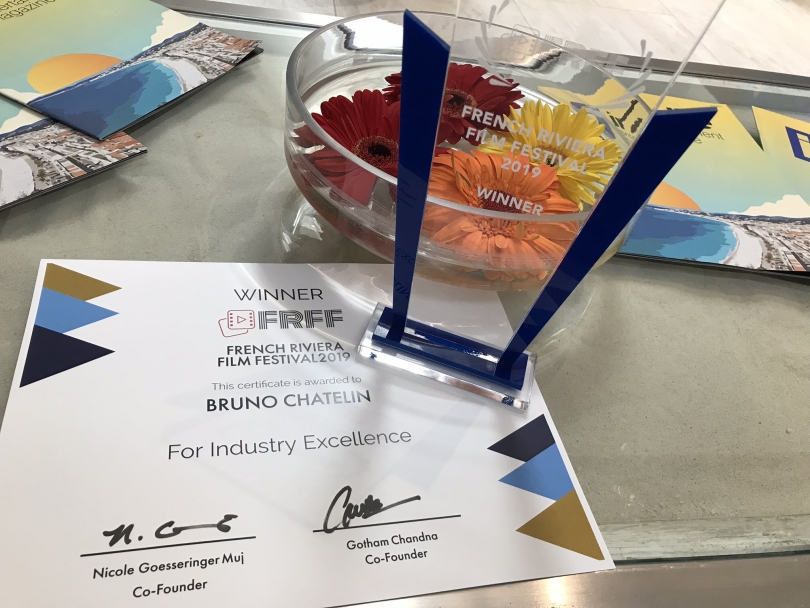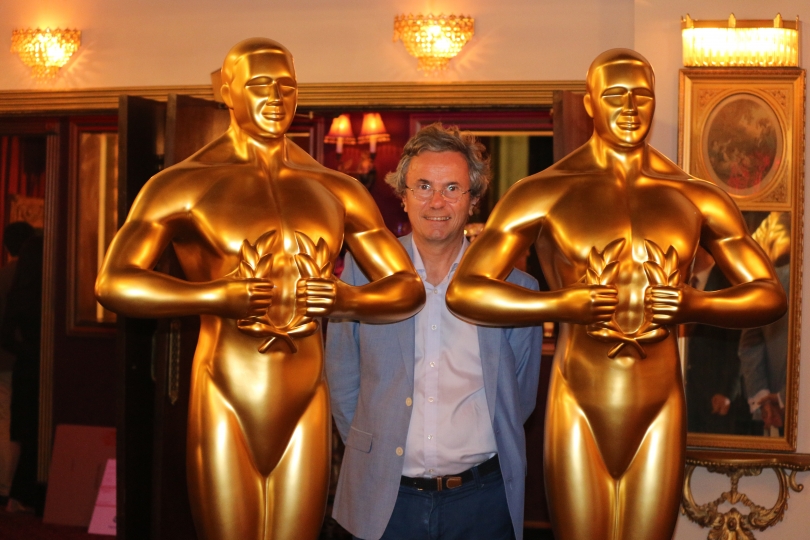ln June the public media authorities of North Rhine Westphalia (NRW), the most populous German state with the largest economic output, staged the annual Medien Forum in close cooperation with the media industry and professional associations. The Forum was first initiated in 1988 by the governing social democratic party and had the objective of facilitating the transition of NRW’s steel and coal based economy to a knowledge intensive service economy with a strong information and media component. These original goals of the Medien Forum have been largely met. North Rhine Westphalia has become the biggest German audiovisual service provider with a labor force of 330 000 and generated in 2006 about $ 150 billion in revenues through 60 000 companies in that sector. It t is the home of the largest continental public television station, WDR and of the biggest European private broadcaster RTL and accounts for about one third of all television programs produced in Germany. Further, it ranks first in German film productions. Over the last ten years the media and information sectors had above average growth rates in NRW.
A conservative coalition is now defining policies governing the media and information sectors and continues the pro-active approach. But it places a stronger emphasis on the need to compete for public grants and other forms of support. Thus the media sector has been identified as one of the 18 clusters central to NRW's development ranking as important as the fields of biotechnology, logistics, and health sciences. According to the key note of NRW's governor Juergen Ruettgers at the Medien Forum, the official NRW media cluster permits companies in that field on a competitive basis access to European Development Grants of close to $5 billion. The NRW government will maintain the level of support for the NRW Film Stiftung, the largest German foundation facilitating film productions [and distribution on as well as other related areas]. But in addition the state is setting up a new state film fund for productions carried out in NRW. Further funds will be available through the state bank to start up film companies lacking capital.
At the Medien Forum both Ruettgers and his fellow party member, Chancellor Angelika Merkel emphasized that market considerations alone cannot replace media policies. Specifically the chancellor was critical of neo-liberal Brussels bureaucrats who do not respect the cultural identities and differences of European Union member states. Specifically the German situation e education, culture and media are subject to policies articulated by state authorities and not the federal government. Put differently, market mechanisms alone should not be not allowed to determine cultural contents.
This approach to public media policy and its variations as debated each year at the Medien Forum have resulted in firm support for German public television and its internet and digital permutations, much to the chagrin of German commercial television. Over the last decade in Germany commercial television has not been able to erode the audience share of public television which amounts now to about 45% of all viewers. As in France, the leading broadcasters are public. Independent documentary and feature filmmakers do benefit from the large presence of public television to an extent unknown in the United States. For once, main line public broadcasters such as the first chain ARD and its powerhouse WDR (a station with an annual budget ten times larger than the US flag ship public television station WNET/13) and the second chain ZDF provide programming time in their main schedules, the third program, and through special platforms such as 3sat and the famed German-French television venture "arte". arte offers, the sharpest, most demanding and uncompromising television programs available today.
As any frequent visitor of international film festivals can observe the big share of mostly outstanding feature films and documentaries crediting arte or the NRW Filmstiftung (film foundation) as funding/production partner clearly demonstrates the positive impact of public support for film making. Apart from programming time, Germany's public broadcasters ZDF and WDR, but also the commercial RTL provide funding to the NRW Filmstiftung which disposes of a $43 million budget in 2007, of which ten percent are restricted to first time film makers. By the end of 2006 the Filmstiftung had provided close to half a billion dollars in production funding to more than 1000 film productions which used to include a significant number of US American productions before the Filmstiftung shifted its focus to serve primarily European and affiliated countries..
During the 2007 Medien Forum, the Filmstiftung organized the International Film Conference with seminars on funding and distribution trends for European films and co-productions, as well as pitching sessions. In the KinoSpezial or Film Forum section of the conference productions were presented which reflected past and present cooperative ventures including among others VIVERE (Angelina Maccarone), GEGENUEBER (Victoria Trauttmansdorff), THE EDGE OF HEAVEN (Fatih Akin), SWEET MUD (Dror Shaul), and DIE GERMANEN (WDR). Though the audience viewing all parts was small, the marathon screening of Fassbinder’s classic BERLIN ALEXANDERPLATZ was an undisputed highlight of the conference. The Screening spread over 16 hours followed on next day by the rather demanding Epilog. The Filmstiftung was instrumental in getting the Berlin Alexanderplatz production remastered.
Panels at the Median Forum served to introduce an element of realism into the debate about film and television and the impact of new distribution technologies as well as interactive internet use. Certainly there is fragmentation on the fringes of the audience with data showing that 'passive' television viewing remains predominant, accounting for more than 80 percent of the audience. Industry research shows that in the United States each year more hours are spent on the consumption of visual media (television, video, cinemas) and less on reading hard print. Negroponte's 1995 prognosis that by 2005 more people will view the internet than television belongs now to the dustbin of technology driven assessments. Even youth watches more television than in the past since reception is no longer site specific. There was a consensus shared by most panelists that content and engrained visual consumption patterns remain kings and not new technologies and platforms. Most viewers do not care how their favorite images reach them, nor are they interested in the analog or digital gestation of these images. Influential groups on the fringes, mostly from upscale socio-economic backgrounds are certainly involved on non-linear interactive video use, as acknowledged by the Medien Forum’s On Line Awards handed out for the seventh time by the prestigious Grimme Institut.
While public support for production funding and distribution has enhanced the status of some European Films, critics still question if such support is sufficient without stronger cultural directives by the government. The European film does not travel well to neighboring countries. Success of a German film in France and vice versa is the exception rather than the rule. US American film productions dominate the European box office and have higher shares than local productions, except for France in 2006. US box office shares ranged in 2005 from 45% in France to 65% in Germany, compared to the local shares of 44% in France and 20% in Germany. European films were far behind with 8 and 9 percent respectively.
Over the last years German films have had more acclaim in international markets, Films like GOOD BYE - LENIN, THE LIFE OF OTHERS, DOWNFALL (DER UNTERGANG), and HEAD ON (GEGEN DIE WAND , have established credibility and box office value for the German film thus eased distribution deals for other German films. But it is doubtful that this success could have come about without the public support system film makers enjoy in Germany and other European countries.
Claus Mueller, New York Correspondent
filmexchange@gmail.com
.
.
.

 Chatelin Bruno
Chatelin Bruno 




























